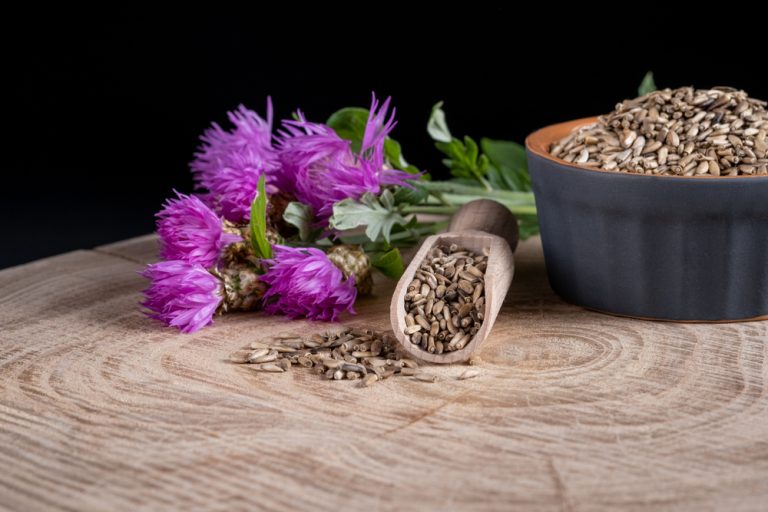Thistle for liver and detoxification
Milk thistle owes its medicinal properties to silymarin. This is a complex of flavonoids (specifically, flavonolignans, mainly silibinin), which is found in the greatest quantity in the husks of the thistle seeds.
Silymarin has hepatoprotective properties. That means it has a protective effect on liver cells. It protects them from the action of toxic substances (including drugs) and stimulates their regenerative capacity. At the same time, it has a cholagogic and cholepoietic effect, supporting digestion and limiting the formation of gallstones. For this reason, medicines prepared with silymarin are mainly used as an adjunct in liver and gallbladder diseases or disorders, as well as after eating greasy food in large quantities. Sometimes silymarin is combined in preparations with cinchona extracted from artichoke with similar properties, which enhances their effect.
However, remember that serious liver diseases are no trifles and herbs will not help in every case. In such a situation it is best to leave the treatment to a hepatologist and consult the possible supplementation with herbal preparations. The advice of your doctor regarding the use of thistle should also be sought if you suffer from chronic diseases (e.g. diabetes, kidney disease) and are constantly taking medication. The specialist should also help you choose the right dosage of silymarin preparation for you. However, taking thistle preparations during pregnancy and lactation is not recommended.
Thistle for weight loss and a beautiful complexion
Silymarin does not only support the liver. Since it also supports digestion and regulates bowel movements, it is recommended for people wishing to lose excessive fat tissue. Be careful though - it may have a laxative effect.
It is also recommended as help in acne treatment since silymarin soothes inflammation and regulates sebum secretion. The flavonoids contained in the seeds, as antioxidants, contribute to slowing down the aging process.
The thistle seed oil also has a beneficial effect on the skin, which on the one hand helps to maintain proper hydration, and on the other supports its regeneration.
Thistle - how to take it?
In addition to preparations containing silymarin and thistle seed oil, whole or ground thistle seeds are also available. Unfortunately, silymarin does not dissolve in water (it is obtained by extraction in alcohol, for example), so drinking thistle seed infusions is of little use to us. However, since they are rich in protein, they can be added to yogurt, salads, or healthy grain and cereal bars, for example. And thanks to the content of phytosterols (plant sterols), especially beta-sitosterol and stigmasterol, they help regulate blood cholesterol levels.
The usual recommended dosage is 2-3 tablespoons of seeds per day. However, it is advisable to read the manufacturer's recommendations or the information on the label and follow these recommendations first and foremost.






